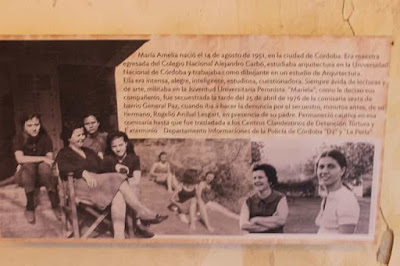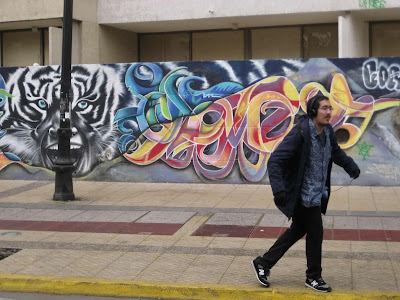I really owe you more than pictures, but it’s hard keeping track of and sorting out my impressions and what I’ve been told. People I see on the streets - what they look like, what they wear, their constant cell phone use - look exactly like the people I see in the US. Pizza and hamburguesas and beer are among the most popular foods here in Cordoba. But these folks live among buildings that, in a few cases, go back to the 1500s. They walk down narrow streets with little shops on every block - at least in this neighborhood - with fresh fruit and vegetables, eggs, and a few other items, that are right next to bakeries with all sorts of decadent sweets. There’s history here (not counting the original people prior to European conquest) that makes even the US east coast seem young.
Argentina has free health care and free higher education.
US citizens have a way of feeling superior to the rest of the world, but there’s more to culture than military superiority. Of course, this is what I’ve discovered every time I’ve been to a new (for me) part of the world. People are people. And everywhere you go there are very smart, sophisticated people. People with great common sense and wisdom. And there are jerks. When we were surveyed at the airport by someone from a tourism agency, we were asked to rate a number of things. I asked if we were going to be asked about the people. No, we weren’t. Well, I said, you should ask us. The people were absolutely the best part of our trip. Tolerant of my terrible Spanish and always wanting to know “De desde son?” Where are you from? And Alaska always elicits a smile and ‘frio.’
That said, here are the pictures. These are two days old. We walked up to Plaza San Martin, the center of Córdoba, Argentina’s second largest city. While we were at the Museum of Memories, a group came in with a guide speaking in English and when we listened in we got invited to join. It’s a company that puts on free tours - it’s up to you to decide what to pay the guide. The group was mostly Spanish speakers and the English speakers got a much shorter version. And two dropped out during the two hour plus tour, leaving just us.
But first here’s a picture from our 8th floor balcony. Airbnb had a two bedroom apartment for under $50 a night. It’s by far the most spacious place we’ve stayed. Well, the Buenos Aires homestay was bigger, but we didn’t have it to ourselves.
I couldn’t pass up the shadows - also from the balcony.
This is the inside of the main Cathedral on Plaza San Martin. If you’ve been reading the blog lately, you’ve heard this name before. San Martin, someone said, was the George Washington of Argentina. But he was more than that. Besides getting Argentina free from Spain, he did the same in Chile. Then passed the torch to Simon Bolivar in Peru.
Here’s a view of the plaza. It’s much warmer here in central Argentina. Up to about 70˚F in the afternoon.
If you look closely below, you can see a long line of people at the bank. We’ve seen shorter lines before and asked. Someone suggested about a Friday lineup that people were getting money out for the weekend and wanted to get their money in case the ATMs ran out of money over the weekend. In this case, it was Tuesday after a holiday weekend. (This is here because it was on the way to Plaza San Martin.)
The Museum of the Memories is in a former detention and torture center from the 1970s when the government rounded up suspected opponents.

The Free Tour guide (in the red in the center) said about 30,000 people disappeared. Tortured to death, shot, and others were thrown out of airplanes over the ocean. Children were kidnapped and given to other families. I knew some of this. Netflix has The Official Story up - well it’s here in Spanish without English subtitles. It’s about this period.
I was going to save this museum for a post all its own, but I have so many backed up photos I should just put it up. It’s a chilling account. 30,000 people is a tiny fraction of the population. But if it’s your son or daughter or husband, it’s everything. And all the relatives and friends and acquaintances of 30,000 people is enough to spread terror among millions of others that they will be next. Sort of like undocumented Americans waiting for ICE to knock on their doors.
Buzzfeed reported in May that over 52,000 people were being held in ICE detention centers. The vast majority of these are decent, innocent people fleeing violence in their own countries. But the Trump administration is full of heartless people who easily rationalize the evil they are doing. Here is a picture of some of their Argentinian colleagues from the 70s and 80s.
. The guide mentioned that the detention center that houses the museum is right next to the cathedral and part of the cabildo - the main government building of the province. Both were complicit.
Here are a few more memories.
This giant (5 or 6 feet high) fingerprint is made up of names of the disappeared. There were several more such fingerprints on the wall.
A courtyard in the detention center.
A poster about one of the young women who disappeared.
Another victim.
And interrogation room, I think.
The difference between what happened in Chile and what’s happening today is great. We still have enough accountability that people aren’t being actively and intentionally tortured or thrown out of airplanes into the ocean. But it’s not because some of the people in charge wouldn’t do those things if they could. They did it at Guantanamo. We still have some safeguards. But being locked up indefinitely without adequate food and, bad sanitary conditions, having your kids separated from you, is all pretty terrifying by itself. We’re watching the cold-bloodedness of Mike Dunleavy in action. He would have gone along with the men in the picture above. And I’m guessing the 22 legislators who went to Wasilla and refused to vote to override the vetoes have moral compasses that don’t recognize evil either.




















































